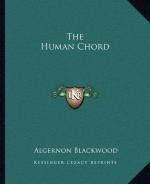It surprised him too—when he thought of it, which was rarely—that a girl who was perforce of humble origin could carry herself with an air of such complete and natural distinction, and prove herself so absolutely “the lady.” For there was something about her of greater value than any mere earthly rank or class could confer; her spirit was in its very essence distinguished, perfectly simple, yet strong with a great and natural pride. It never occurred to her soul to doubt its own great value—or to question that of others. She somehow or other made the little secretary feel of great account. He had never quite realized his own value before. Her presence, her eyes, her voice served to bring it out. And a very curious detail that he always mentions just at this point is the fact that it never occurred to him to wonder what her surname might be, or whether, indeed, she had one at all. Her name, Miriam, seemed sufficient. The rest of her—if there was any other part of her not described by those three syllables—lay safely and naturally included somewhere in his own name. “Spinrobin” described her as well as himself. But “Miriam” completed his own personality and at the same time extended it. He felt all wrapped up and at peace with her. With Philip Skale, Mrs. Mawle and Miriam, he, Robert Spinrobin, felt that he naturally belonged as “one of the family.” They were like the four notes in the chord: Skale, the great bass; Mawle, the mellow alto; himself and Miriam, respectively, the echoing tenor and the singing soprano. The imagery by which, in the depths of his mind, he sought to interpret to himself the whole singular business ran, it seems, even then to music and the analogies of music.
The meal was short and very simple. Mrs. Mawle carved the joint at the end of the table, handed the vegetables and looked after their wants with the precision of long habit. Her skill, in spite of the withered arm, was noteworthy. They talked little, Mr. Skale hardly at all. Miriam spoke from time to time across the table to the secretary. She did not ask questions, she stated facts, as though she already knew all about his feelings and tastes. She may have been twenty years of age, perhaps, but in some way she took him back to childhood. And she said things with the simple audacity of a child, ignoring Mr. Skale’s presence. It seemed to the secretary as if he had always known her.
“I knew just how you would look,” she said, without a trace of shyness, “the moment I heard your name. And you got my name very quickly, too?”
“Only part of it, at first—”
“Oh yes; but when you saw me completely you got it all,” she interrupted. “And I like your name,” she added, looking him full in the eye with her soft grey orbs; “it tells everything.”
“So does yours, you know.”
“Oh, of course,” she laughed; “Mr. Skale gave it to me the day I was born.”
“I heard it,” put in the clergyman, speaking almost for the first time. And the talk dropped again, the secretary’s head fairly whirling.




